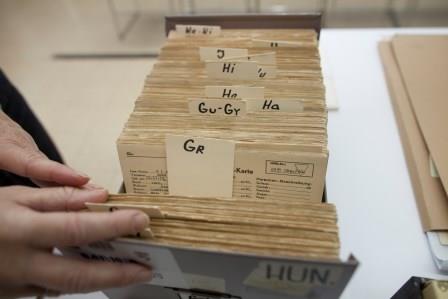CfP: EHRI Workshop at Yad Vashem: Holocaust Archival Film Footage as a Historical Source

Methodology and Ethics in the Digital Era
International Workshop within the Framework of the European Holocaust Research Infrastructure (EHRI)
Yad Vashem, Jerusalem
19-21 September, 2016
We would like to invite you to participate in the international workshop on Holocaust archival film footage to be held at Yad Vashem, Jerusalem on 19-21 September, 2016.
Archival Footage is filmed documentation of historical or personal events created by official authorities, local entities, and individuals, professionals as well as amateurs. (In terms of Holocaust-related film footage created before, during and immediately after the war, examples would be: official authorities – e.g. newsreels; local entities – e.g. camp officials; individuals – e.g. Jewish family films, German soldiers.) Archival footage is an important source for Holocaust research, and it is a major element in the construction of the visual memory of the Holocaust. As such, it is a highly important source of information on individuals and communities; it has a significant role in shaping Holocaust consciousness, commemoration and scholarly research, especially in the current audio-visual digital era. This footage should be approached as any other historical document: it should be viewed critically, and cross-referenced with other sources before it is catalogued and utilized in any context.
Narrative
Each footage has a narrative, determined by the point of view and objectives of those who filmed, produced or directed it. In many cases, information about archival footage is scarce, which requires deciphering its different layers: what is depicted, the circumstances, etc. Archival footage can reveal the motives and beliefs of its authors, as well as provide certain information about its subjects. Thus, the complex and frequently antagonistic relationship between the photographers and their subjects, must be one of our major concerns as we analyze realities, representation and significance of archival footage.
Call for Papers
The target groups of this international workshop are archivists, collectors, researchers, scholars, filmmakers, curators, and all others who work with archival footage. The workshop’s objective is to enhance cooperation among people who work in archives that collect Holocaust related film footage.
Proposals are now being accepted for individual presentations.
Topics of interest include but are not limited to:
- Creating a shared terminology and methodology for describing archival footage, for determining its temporal and geographical frames of reference, and for identifying people and events appearing in it, by using methodological tools employed by a variety of disciplines, e.g. archaeology, forensics, and digital humanities
- Mapping and collecting archival footage; using digital tools to access collections worldwide; and integrating different sources of data in order to share knowledge
- Examining the ethics of using footage for various purposes, education, filmmaking, and exhibition curation
- Copyright issues: privately held, public domain, orphan footage, multiple holders, fair use, misuse – and all of the above in the digital age
- Ethical issues of restoration and preservation of archival footage
- Challenges, contextualization, ethics and artistic freedom from a filmmaker’s perspective
We are open also to suggestions for additional aspects within the general topic.
Each accepted proposal will be allotted between 15 to 20 minutes for presentation followed by discussion (to clarify: this is an experts’ workshop rather than a conference and, as such, ample time must be provided for questions/discussion).
The workshop will be conducted in English. Translation from or to other languages will not be available.
All workshop sessions will be led by a moderator.
If you are interested in giving a presentation, please send a short 500 word proposal and a CV (including all relevant contact information) to: Ms. Lital Beer, lital.beer@yadvashem.org.il
The deadline for submissions of proposals is 1 June 2016.
Notification of acceptance will be sent via email by 15 June 2016.
Funding for travel and accommodation will be available to participants in accordance with European Commission guidelines and the EHRI project budget.
Contact
Proposals send to: Ms. Lital Beer, lital.beer@yadvashem.org.il
Questions on administrative matters send to: Mr. Hillel Solomon, hillel.solomon@yadvashem.org.il
